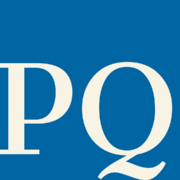Pewlett Quayle
 PQ's logo since 2014 | |
 PQ's Headquarters and Labratory in Labrador. | |
| Traded as | PQI |
|---|---|
| Industry | Pharmaceuticals and Biotechnology |
| Founded | April 12, 1872 |
| Founders | Dr. John Egan Pewlett and Dr. Gerhardt Quayle |
| Headquarters | PQ Campus Complex, , |
Area served | Worldwide |
Key people | Dr. Mark Riggs (CEO) |
| Products | Pharmaceuticals, Medical equipment, Vaccinations |
| Brands | MindEase, Penacilithol, NightEase, SoulEase, Hamhoff's |
| Revenue | $40.1 Billion (2021) |
| $10.2 Billion (2021) | |
| $11.4 Billion (2021) | |
| Total assets | $93.4 Billion (2021) |
| Total equity | $43.3 Billion (2021) |
Number of employees | 43,700 (2021) |
| Divisions | PQ Medical Research, PQ Manufacturing, PQ Technological Research, PQ Worldwide response, PQ Pharmacare, PQ Agricultural Innovation, PQ Education Innovation |
| Website | www.pq.com |
Pewlett Quayle is a Delamarian pharmaceutical, biotechnology and health company, headquartered in Labrador. PQ is one of the wurld's largest producers of pharmecuticals such as penicillin, paracetomol as well as vaccines. It is also the wurlds largest producer of MRI machines and Ultrasound machines.
The company was founded in 1872 by immigrants Dr. John Egan Pewlett and Dr. Gerhardt Quayle in Labrador. The business initially took the form of a local chemist and a small manufactory. During the Flu of 1881 demand for medication exploded, and Pewlett and Quayle were the only in Labrador with the equipment to keep up with demand. During the outbreak PQ took advantage of the situation and their constant income streams to buy out its rivals in the south east and following the epidemic they were the largest pharmaceutical manufacturer in Delamaria, dominating the industry despite only possesing a few storefronts and two manufactories only a few years prior.
In the early 20th century PQ expanded its reach, from only producing medication to being at the forefront of medical innovation and invention. PQ were some of the first to produce 'iron lungs' for polio victims. PQ also funded scientific research into bacteria and viruses, and in 1931 held the patent for penacillin, however they would lose it under the McMadden administration. PQ were also one of the first to create viable vaccines for polio, smallpox, measles and meningitis. In 1951 to assist with greater demand for food during the First Argic War, PQ established its agricultural innovation division, where it partnered with Conover to produce fertilizers and later genetically modified foods to boost agricultural production.
Pewlett Quayle also expanded into technological innovation and production, and is now one of the wurld's largest producers of medical equipment, including MRI machines, Ultrasound machines, biosensors and life support machines. PQ established the first of its eighteen medical schools in 1971. PQ also trains most of the wurld's neurosurgeons through its international education programs in many technical subjects, and has now established over two hundred physical and mental health clinics globally. PQ plays a pivotal role in global health management, being the wurld's largest non-governmental vaccine producer, maintaining a global health emergency response centre in its headquarters in Labrador, and posts around the wurld to monitor health emergencies.
Controversies
Allentown incident
In July 1968 PQ scientists were sent to the remote town on Allentown in Gerandy, Delamaria. Allentown had been facing an oubreak of mutated Hepititis and had been quarentined by the state government. PQ distributed the unapproved antiviral drug Fexagontlyn to the locals, in part to test its effectiveness. The locals werent aware that the drug was experimental nor that it was unapproved. In total 209 people died and 434 people became ill with many becoming paralysed, blind or mentally damaged. The company initially blamed the deaths and illnesses on the mutated hepititis and recommended that the quarentine remained. However a government investigation found that a majority of the casualties were a result of PQ's activities, however no charges were filed.
Ben Scout affair
In 1993 PQ employee Ben Scout died in a PQ cafeteria, Scout was a virologist working at PQ's Alberta labratory, and had been infected with a modified deltavirus. By Delamarian law corporations must seek permission to produce new viruses however PQ did not apply for Scout's work. PQ security staff working on behalf of Medical Innovation head Dr. Yuri Janov disposed of the body by cremating it in the labratory. Scout had little family and few friends and his disappearence went unnoticed until Dr. Janov's assistant who had assisted in the coverup was fired and immidiately reported the incident to the Investigation Bureau. In 1995 the event was fully publicised and those involved were arrested and charged. A congressional committee found that PQ executives were likely aware of the affair, however the Speaker of the House of Delegates made a move to reshuffle congressional committees, and within a week the new investigating committee turned course and no new charges were made against PQ.